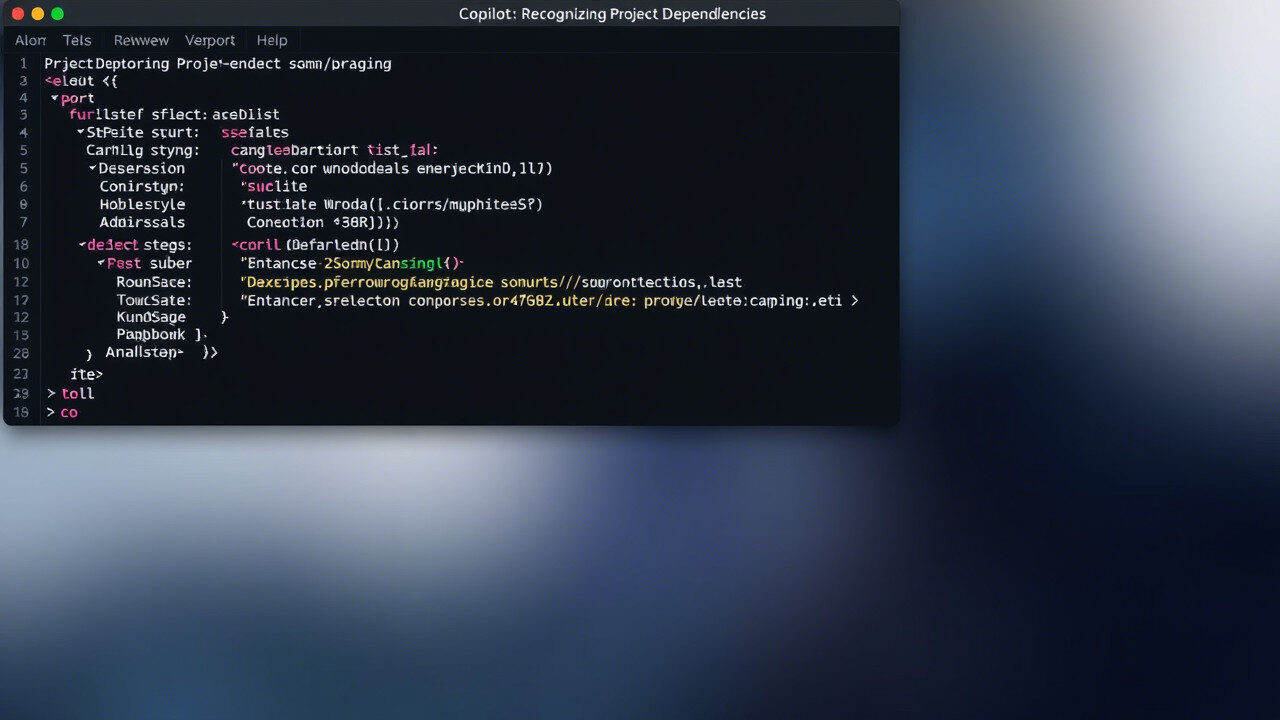Developed by GitHub, Copilot is a unique AI-based virtual assistant that mostly tends to accelerate and enrich code development. It performs extensive actions such as propriety line or entire function suggestion and complex code problem solving. Its performance has indeed been associated with the project environment. One of the frequent concerns with developers is about Copilot performance failing when addressing project dependencies which leads to false affirmative suggestion misses or irrelevant code completions.
This article dives deep into the root-cause analyses in terms of dependency issues along with unrecognized libraries giving the user an exhaustive comprehension of troubleshooting. Once acquired, it Suitablely configures Copilot to suggest the suitable assignments hence increasing productive output and quality of code.

🔍 What Causes Copilot to Miss Project Dependencies?
Essentially, before considering how to go about the remedy, it is necessary to understand why Copilot recognised no dependencies in the first place. Before diving into solutions, it’s essential to understand why Copilot might fail to recognise dependencies in the first place.
- Dependence Declaration Missing or Incomplete: Dependencies may have been incorrectly listed in the manifest file relevant for them, such as package.json (JavaScript), requirements.txt (Python), or pom.xml (Java).
- Unresolved Dependency Versions: If dependency resolution fails, Copilot cannot access the correct version of libraries or packages.
- Unrecognized Libraries: Libraries not properly installed, configured, or updated can lead to issues where Copilot cannot detect them.
- IDE Configuration: Sometimes, the development environment (like VS Code or IntelliJ) may not be correctly configured to load the dependencies, preventing Copilot from accessing them.
- Package Manager Problems: Incorrect configurations in package managers like npm, yarn, or pip can also cause dependencies to not resolve correctly.
🧩 Step 1: Ensure Dependencies Are Declared and Installed
The first step toward resolving dependency issues is to ensure that all necessary packages are duly listed in the manifest files it uses (such as package.json, requirements.txt, go.mod, etc.).For JavaScript and TypeScript: Dependencies and devDependencies in package.json must be correctly declared. For instance:
“dependencies”: {
“express”: “^4.17.1”
},
“devDependencies”: {
“eslint”: “^7.32.0”
}
Python: Make sure requirements.txt lists the correct versions of libraries:
requests==2.26.0
numpy==1.21.2
- Java: Ensure the correct libraries are referenced in pom.xml.
After ensuring the dependencies are properly declared, run the installation commands specific to your package manager:
- For npm: npm install
- For pip: pip install -r requirements.txt
- For Maven: mvn install
🧩 Step 2: Perform a Clean Install and Dependency Audit
Unrecognized libraries often happen due to outdated or corrupted modules. To fix this, delete any existing dependency folders (node_modules, venv, etc.) and lock files, then reinstall:
For JavaScript:
rm -rf node_modules package-lock.json
npm install
For Python:
rm -rf venv
pip install -r requirements.txt
For Java (Maven):
mvn clean install
This ensures that dependency resolution is performed from scratch and that any missing or broken libraries are properly installed.
🧩 Step 3: Use Type Definitions and Metadata
For languages like TypeScript, JavaScript, or Python, Copilot may struggle with unrecognized libraries if type definitions are missing. Ensure you have the correct type definitions installed, especially for JavaScript/TypeScript projects. For example, if you’re using Express.js, you may need to install:
npm install –save-dev @types/express
For Python, make sure to include type hints and annotations to assist Copilot in understanding your code’s structure.
🧩 Step 4: Verify Package Manager Configurations
Package manager configuration is crucial. If the dependency resolution process is not working properly, Copilot won’t be able to detect the libraries correctly. Ensure that your package managers (npm, yarn, pip, etc.) are properly configured:
- Ensure that you are using the correct version of the package manager.
- Check if any global vs. local installation conflicts exist.
- Verify your .npmrc, yarn.lock, or equivalent configuration files to ensure the right repositories and registries are being used.
If you’re working in a monorepo, ensure that your workspace configuration is correctly set up to reference all internal packages.
🧩 Step 5: Resolve Version Conflicts
Version conflicts between dependencies can also cause issues where Copilot can’t resolve libraries correctly. Use dependency resolution tools like npm audit, yarn resolutions, or pip check to identify and resolve any conflicting versions.
- npm audit: Automatically checks for vulnerabilities and version conflicts in your dependencies.
- yarn resolutions: Forces specific versions of dependencies in case of conflicts.
- pip check: Helps you find and resolve version mismatches in your Python environment.
🧩 Step 6: Rebuild Your Development Environment
If none of the above fixes work, then there is a good chance the problem is environmental: restarting your IDE or editor will refresh the dependencies. Be sure that correct environment (Node, Python, etc.) is activated and also in cases where a virtual environment or containerized setup is used.
Final Thoughts

Dependency-related problems are capable of causing many different issues, for example, unrecognized libraries, broken code suggestions from GitHub Copilot, and many more. Following the above steps will help you clear the dependency problems with efficiency, suitable to a smooth and productive development workflow. Setting up package manager configurations right, properly installing and updating dependencies, as well as ensuring type definitions are set, will lead Copilot to deliver relevant and accurate code suggestions, making your overall development experience a much better one.
Why TechNow Is the suitable IT Support Service Agency in Germany
TechNow is the suitable agency for IT support in Germany helping users with their dependency issues, package manager configuration, and smooth dependency resolution. Having a core of expertise in DevOps, CI/CD pipelines, and software infrastructure management, TechNow provides end-to-end solutions to ease the development environment and solve all kinds of conflicts in order to maximize your team’s productivity. Whether it’s monorepos, complex dependency trees, or other wigglies like AI tools Nepal, TechNow will assure that your development gets done on time, every time. Join hands with us today for specialized support tailored to your business.



